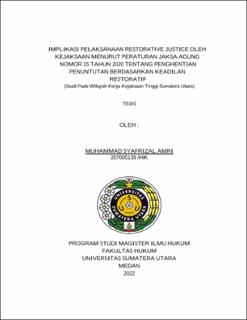| dc.description.abstract | Prosecution is an authority that only belongs to the Prosecutor's office. The presence of Perja Number 15 of 2020 is the basis for the prosecutor's office to make efforts to stop prosecutions based on restorative justice. There is an urgency for the Prosecutor's Office to stop prosecution based on restorative justice. The implementation of efforts to stop prosecution based on restorative justice by the Attorney General's Office has juridical implications for the litigants, law enforcers in the criminal justice system and stakeholders. In addition, its implementation in the work area of the North Sumatra High Prosecutor's Office was ineffective, this can be seen from several factors and indicators.
This study uses a combination of normative legal research and empirical legal research. This research is a descriptive analysis in nature that analyzes and explains something that is done in a way that does not go outside the scope of the problem and is based on a general theory or concept and is applied to explain a set of data, or shows comparisons or relationships between a set of data and another set of data. The approach used in this study is the statutory approach (statue approach) and the conceptual approach (conceptual approach).
There are conclusions in this study, including, the urgency of the prosecutor's office to implement restorative justice, namely to strengthen the position of the prosecutor's office as case controller/dominus litis, to overcome the dynamics of criminal law enforcement in Indonesia which seem to burden the state, to fulfill a legal need of society in accordance with the values humanity, law, and justice that live in Indonesian society. The juridical implication of the implementation of Perja Number 15 of 2020 is that there is a waiver of the higher provisions, namely the Criminal Code and the Criminal Procedure Code, then in practice the parties must implement the peace agreement that was made, and if it does not carry it out the public prosecutor can revoke the decision to stop the prosecution and continue the prosecution. The implementation of efforts to stop prosecution based on restorative justice in the work area of the North Sumatra High Prosecutor's Office has not been effective which is influenced by several factors namely, legal substance factors, law enforcers, facilities and amenities, community and legal culture. | en_US |


